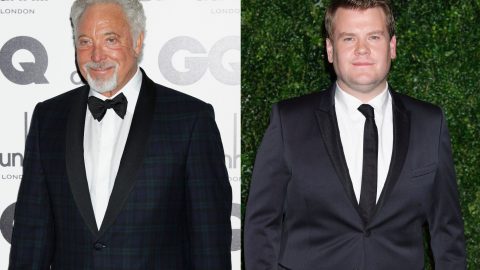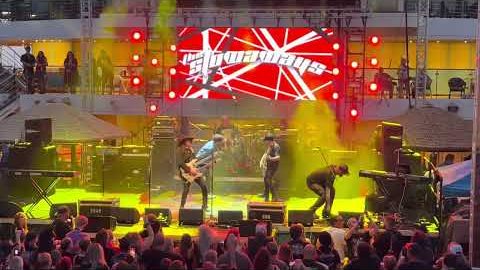
Campaigners and figures within the music industry have spoken out over the need for “urgent” and shared action to improve gender diversity on festival line-ups.
After a year off due to the coronavirus pandemic, it is hoped that festivals will be able to return this summer after the supposed lifting of restrictions from the roadmap end-date of June 21. While lingering fears around coronavirus travel restrictions have led a number of UK festivals to book largely domestic talent this year, there has also been outcry regarding a general lack of gender diversity across many festivals – particularly at headliner level.
Maxie Gedge is the Project Manager of Keychange at the PRS Foundation, aiming to “make positive changes in representation and try to shift the makeup of the music industry”.
“I feel like festivals have an important responsibility, and we’ve had many sign up to the pledge who are making a positive change,” Gedge told NME. “We view gender equality as a very urgent issue that needs addressing in the music industry. COVID has only amplified that. The back-to-live situation makes us super hopeful that we can have some festivals this summer, but when they started to announce these line-ups we were so disappointed.”
She continued: “Festivals are a very important part of the ecosystem, and they get called out on social media a lot because they are one of the most visible displays of the artist hierarchy. We’re just encouraging more people to take responsibility.”

A report last year found that one in three of all musicians were likely to leave the industry due to the impact of the pandemic. Gedge argued that that was “really worrying”, considering that “women and gender minorities are disproportionately affected” and meant that “the value you place on under-represented groups become even more important and urgent”.
On the idea that many festivals might be ‘playing it safe’ with their line-ups to get back on their feet this summer, Gedge replied: “We understand that things don’t change overnight, and I don’t believe that diversity is a risk. It’s an essential part of sustainability and future-proofing. In every report that I read, it makes economic sense, too. It’s not an excuse to say: ‘This is what our audiences listen to’. Audiences are one part of the festival’s ecosystem alongside crew, technical staff and all the other artists playing. Everyone has the responsibility to create the right environment for all talent to flourish.
“I believe that it’s a crunch moment, and instead of committing to making that positive moment many have resorted back to what the industry was before. We know that’s a broken system.”
As well as calling for more festivals to sign up for their pledge, Keychange are also working with talent development to ensure that environments are inclusive as well as representative to bring about wider and long-term change. After the likes of The 1975’s Matty Healy vowed to only play festivals with gender-balanced line-ups, Gedge said that she believed “inclusivity riders” would become more commonplace.
“More and more, if you don’t make these positive changes then you will get left behind,” she said. “Audiences aren’t just passive bodies of people, they’re dynamic. They care more and more about accountability and representation. If festivals don’t respond to that, then they will get left behind.”

Laura Davidson, who was the head booker at All Points East Festival, has recently founded AMIGAS – a “growing collective of industry-leading women professionals who are passionate and dedicated to building back the live sector, better” and aiming to “facilitate, inspire and empower women from all backgrounds to enter the live music industry”. Speaking to NME, she explained the difficult landscape that festivals face in 2021.
“The music industry has been on lockdown for a year now. Without live, most major artists have pushed their album campaigns back, and with a lack of new records being released, it’s very hard to book fresh and exciting bills,” Davidson said. “There were obviously some festivals that rolled the line-ups over from 2020 to 2021 in order for ticket holders to keep hold of their tickets.
“Other festivals were trying to book a line-up from fresh, but without any guidance from the government as to whether live events are going to be able to go ahead, or knowing if international artists are going to be able to enter the country, or on what terms. A lot of festivals have [therefore] ended up having to book mostly domestic talent.
“This is obviously a good thing for a number of reasons, but maybe doesn’t show quite the same depth or imagination.”
While recognising that “festivals have had to do what they can given the impossible circumstances”, Davidson said that the lack of diversity was a returning problem “year-on-year”, and now “something needs to change” on both a micro and macro-level.
“I feel like now is the time for the industry to come together and work out how the gender balance throughout the whole industry can be addressed,” she said. “Labels, managers, artists and promoters should all be looking at their rosters and ensuring they are supporting women and gender minorities. The whole ecosystem is so male-dominated and this needs to change.
“Not only do we need to look at the industry as a whole, but even deeper than that, and the cuts that have been made in education by the government. The problem is, as it stands, there are just not as many female artists available for certain slots, as male. If you’re Glastonbury and you’ve got the pick of pretty much any artist that you want to book, and artists will plan their whole summer around playing your festival, then it’s obviously much easier to book a diverse and balanced bill.
“However, booking festivals is so incredibly competitive and it’s not quite as simple as booking every artist you want to book. There are politics and exclusivities that get in the way of this and unfortunately it often comes down to how big your cheque book is! This is often left out of the commentary.”

She continued: “If you are an established festival, which is likely to sell out year on year, you should be making much more of a commitment to ensure the line-up is balanced. That means supporting up-and-coming artists to ensure they are getting the opportunities now, and will be playing the bigger slots and possibly headlining in years to come.”
Despite “a very difficult year for the industry as a whole”, Davidson said she hoped that 2022 would the start of festival line-ups being “able to demonstrate that some real headway has been made”.
“There’s so much to be done and that is what we’re here to help to do,” she added. “It’s going to take longer than a year but I feel that it is achievable in five years with the whole industry pulling in the same direction and taking positive action.”
Spain’s Primavera Sound Festival have made headlines in recent years with their “new normal” of a 50/50 gender split line-up while Norway’s ØYA Festival has achieved this every year since 2017, while around 45 international festivals and conferences pledging to have gender-split bills by 2022. London’s Cross The Tracks festival is set to pull off that very feat this summer.
“Cross The Tracks is a festival born of the love of great music and the awareness of the diverse and unique history surrounding jazz, funk and soul,” booker Saskia Hadley told NME. “We aim to not only represent, but platform and showcase emerging talent, and focus largely on women and individuals from underrepresented communities. Time and time again the industry has shown itself to fall into less inclusive patterns, but we commit to championing female artists and ensure our programming is reflective of our values and beliefs.
“With close to 50 per cent of our acts, including our headliners (more to be announced), female-led and several Emerging Artist initiatives to support female talent, we’d love to see this as the industry standard, not the anomaly.”

Glastonbury’s initial line-up for 2020 also had a gender-split bill after boss Emily Eavis spoke about her experiences with the festival’s booking team not getting the need for gender-balanced line-ups since she started to push the festival towards that goal. “The thing about the men who book [our] stages, quite a lot of them are old men,” she said at last year’s Annie Mac Presents conference. “They don’t understand why I am pushing them the whole time.”
She also described the connections between bookers and agents as something of a boys’ club, adding: “There’s a whole brotherhood which is so tight. It’s impenetrable.”
Visit here for more information on Keychange, and here for more on AMIGAS.
Recent weeks have seen a number of festivals being forced to cancel due to a lack of government-backed insurance. The latest is 2000Trees Festival, who told ticket-holders today (April 26): “Hundreds of festivals have been asking for months for a Government-backed insurance policy allowing us to confidently host events this year. We were hopeful that this insurance would be in place by now.
“Although they’ve provided a similar scheme for film and TV, the Government have completely let the live music industry down by refusing to back a simple insurance policy.”
The post Campaigners say festivals will “get left behind” if they don’t bring about gender diversity on line-ups appeared first on NME.





